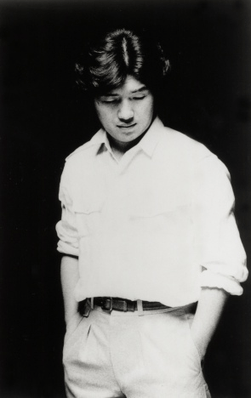Eiichi Ohtaki facts for kids
Quick facts for kids
Eiichi Ohtaki
|
|
|---|---|

Eiichi Ohtaki in 1981 promoting A Long Vacation
|
|
| Background information | |
| Birth name | Eiichi Ohtaki (大瀧 榮一) |
| Also known as |
|
| Born | July 28, 1948 Esashi District, Japan |
| Died | December 30, 2013 (aged 65) Mizuho, Tokyo, Japan |
| Genres | City pop |
| Occupation(s) |
|
| Instruments |
|
| Years active | 1969–2013 |
| Labels |
|
Eiichi Ohtaki (July 28, 1948 – December 30, 2013) was a famous Japanese musician. He was a singer, songwriter, and record producer. He first became known as a member of the rock band Happy End. But he was even more famous for his solo music, which started in 1972.
In 2003, HMV Japan ranked Ohtaki as one of the top 10 most important Japanese pop artists. Music writer Patrick Macias called his work "an encyclopedia of everything that was great about pop music in the 20th century."
Contents
Biography
Early Life and Happy End
Eiichi Ohtaki was born in Esashi District, Japan. This area is now part of Ōshū. Before joining the band Happy End, Ohtaki played guitar in a group called Taboo.
Happy End released three albums. These were Happy End (1970), Kazemachi Roman (1971), and another Happy End (1973). The band officially broke up at the end of 1972.
Solo Career and Niagara Records
Ohtaki released his first solo album, also called Ohtaki Eiichi, in November 1972. This album featured tuneful folk-rock and country rock songs.
He also became a record producer, helping other artists make their music. He produced the rock band Sugar Babe. After Sugar Babe broke up, he continued to produce its members, Taeko Onuki and Tatsuro Yamashita.
In 1975, Ohtaki started his own record label called Niagara Records. Sugar Babe's only album, Songs, was the first music released on this new label. A month later, Ohtaki released his second solo album, Niagara Moon.
In 1976, Ohtaki teamed up with Tatsuro Yamashita and Ginji Ito. They released an album together called Niagara Triangle Vol. 1. MTV later called this collaboration one of the important Japanese supergroups.
Later that year, Ohtaki's third album, Go! Go! Niagara, came out. On this album, he recreated the sounds of his favorite records from his youth. His 1977 album, Niagara Calendar, showed his improved singing. It included different music styles like merengue and Okinawan music.
In 1978, he released Let's Ondo Again. This album was credited to "Niagara Fallin' Stars." Ohtaki produced all the songs and wrote many of them. Other singers, like Rats & Star, performed on the album.
Major Success and Later Work
Ohtaki's 1981 solo album, A Long Vacation, is very famous and highly praised. It was one of the first albums to be released on CD. It won the Best Album award at the 23rd Japan Record Awards. The album sold over two million copies. In 2007, Rolling Stone Japan named it the 7th greatest Japanese rock album ever.
In 1982, Ohtaki released Niagara Triangle Vol. 2. This time, he worked with Motoharu Sano and Masamichi Sugi.
After his 1984 album Each Time, Ohtaki mostly stopped releasing music as a solo artist. He focused on writing songs and producing music for other singers. In 1997, he released the single "Shiawase na Ketsumatsu." This song was used as the theme for the TV drama Love Generation. It sold over a million copies. His 2003 single "Koisuru Futari" was also a TV drama theme song.
Death and Legacy
Eiichi Ohtaki passed away on December 30, 2013. He was at his home in Mizuho, Tokyo. His official cause of death was a dissecting aneurysm.
In 2014, Ohtaki was given a Lifetime Achievement Award at the 56th Japan Record Awards. In March 2016, an album of his unreleased songs called Debut Again was released. This album featured Ohtaki singing songs he wrote for other artists. Another album, Happy Ending, was released in 2020. It celebrated 50 years since his music debut.
Discography
- Studio albums
- Ohtaki Eiichi (大瀧詠一) (King/Bellwood, 1972)
- Niagara Moon (Elec/Niagara, 1975)
- Go! Go! Niagara (Nippon Columbia/Niagara, 1976)
- Niagara Calendar (Nippon Columbia/Niagara, 1977)
- Let's Ondo Again (Nippon Columbia/Niagara, 1978) – credited to Niagara Fallin' Stars
- A Long Vacation (Sony/Niagara, 1981)
- Each Time (Sony/Niagara, 1984)
- Debut Again (Sony/Niagara, 2016)
- Happy Ending (Sony/Niagara, 2020)
- Niagara Triangle albums
- Niagara Triangle Vol. 1 (1976) – with Tatsuro Yamashita and Ginji Ito
- Niagara Triangle Vol. 2 (1982) – with Motoharu Sano and Masamichi Sugi
 | James Van Der Zee |
 | Alma Thomas |
 | Ellis Wilson |
 | Margaret Taylor-Burroughs |

